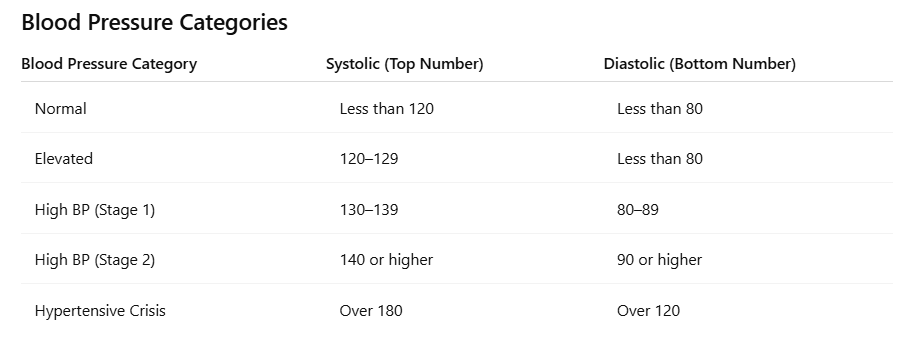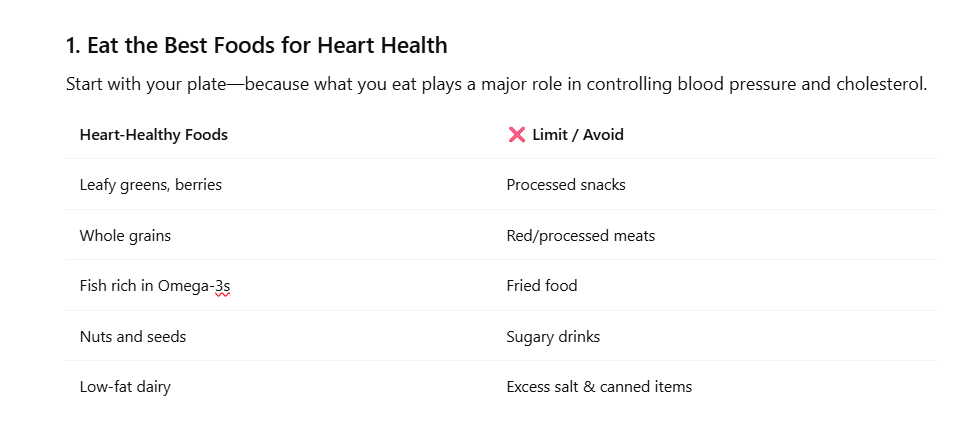High blood pressure, or hypertension, usually goes unnoticed. It often leads to serious problems. You may feel perfectly fine, yet your heart and blood vessels could be under silent strain every day. That’s why hypertension is often called the “silent killer.”
If you’re 30 to 60 years old, juggling work, family, and stress, you might forget health checkups. But keeping an eye on your blood pressure could be the single most important thing you do for your heart.
This guide explains high blood pressure. We’ll cover what it is, why it matters, and how to manage it with simple, doctor-approved steps.
Also Read: Understanding Hepatitis E: Causes, Symptoms, Treatment & Prevention
Understanding Blood Pressure
Blood pressure is the force of your blood pushing against the walls of your arteries. It’s measured using two numbers:
- Systolic pressure (top number): the pressure when your heart beats
- Diastolic pressure (bottom number): the pressure when your heart rests between beats

If left untreated, it can lead to:
- Heart attacks
- Strokes
- Kidney damage
- Vision loss
Signs of High Blood Pressure: What to Watch For
Most people don’t have obvious symptoms — but when they do appear, they may include:
- Frequent headaches
- Dizziness or blurred vision
- Chest pain or palpitations
- Shortness of breath
- Nosebleeds (in severe cases)
If you’re experiencing any of these, it’s important to consult a doctor. Omega Hospital’s Heart Clinic can help with early diagnosis and management.
What Causes High Blood Pressure?
Several factors can raise your risk:
- Lack of physical activity
- Poor diet, especially high in salt, fat, and processed foods
- Obesity or being overweight
- Smoking and alcohol use
- Chronic stress
- Family history
Age is also a risk factor — blood vessels tend to stiffen as we grow older.
Also Read: When to See a Spine Specialist: 7 Warning Signs You Shouldn’t Ignore
The Link Between High Blood Pressure and Heart Disease
Chronic high blood pressure damages your arteries over time. It makes them narrower, less flexible, and more prone to blockages. This can directly increase your risk for:
- Coronary artery disease
- Heart failure
- Irregular heart rhythms (arrhythmias)
Managing your blood pressure is a top way to lower your heart disease risk.
Tips for a Heart-Healthy Lifestyle
A heart-healthy lifestyle isn’t just about one good habit—it’s the result of small, consistent changes that support your body over time. No matter if you’re starting your wellness journey or looking to avoid health problems, these tips can help keep your heart healthy and blood pressure steady.
1. Eat the Best Foods for Heart Health
Begin with your plate. What you eat is key to managing blood pressure and cholesterol.

Eat fresh, whole foods. Start cutting back on sodium slowly. Add heart-healthy foods to your meals, like olive oil, garlic, and oats.

2. Exercise for Heart Health
Physical activity strengthens your heart, improves blood flow, and helps maintain a healthy weight.
- Aim for at least 30 minutes of moderate activity most days
- Walking, swimming, and cycling are great options
- Even household chores count if done with energy!
If you’re new to exercise, start small. A 10-minute walk after dinner is better than no movement at all.

3. Manage Stress
Stress may seem like a mental concern, but it directly impacts your heart. When you’re stressed, your body releases hormones that raise your blood pressure.
Here’s how you can manage it better:
- Deep breathing exercises and mindful pauses during your workday
- Practicing yoga, guided meditation, or nature walks
- Saying no when needed and taking breaks from screens and constant notifications

4. Limit Alcohol and Avoid Smoking
Smoking damages blood vessels and raises your risk of heart disease significantly. Alcohol, especially in excess, can increase blood pressure over time.
Try:
- Cutting back to a few drinks per week (or eliminating it altogether)
- Seeking support groups or counseling for quitting smoking
- Switching to non-alcoholic alternatives at social events

5. Get Regular Heart Health Checkups
No matter how healthy you feel, preventive checkups can spot red flags early. Blood pressure doesn’t always come with symptoms, and a yearly check could save your life.

Diagnosis and Treatment Options
If you’re diagnosed with high blood pressure, don’t panic. It’s manageable often without medication in the early stages.
Your doctor may recommend:
- Lifestyle changes (diet, exercise, sleep, stress management)
- Monitoring your blood pressure at home
- Medications, if necessary, to protect your heart and organs
When Should You See a Cardiologist?
It’s time to consult a heart specialist if:
- Your readings are consistently above 130/80 mmHg
- You have a family history of heart disease
- You experience chest pain, fatigue, or shortness of breath
- You’re already on treatment but not seeing improvement
Early intervention is the best prevention.
Also Read: What Is Lipedema? Understanding the Fat That Won’t Go Away
Your Heart Deserves Attention
High blood pressure may be silent, but its effects can be loud and life-changing. The good news is, you can take charge of your heart health starting today.
At Omega Hospitals, our skilled cardiologists support you from diagnosis to treatment and beyond. If you need to manage blood pressure or want heart care, we’re here for you.
Schedule a heart health checkup at Omega Hospital and take the first step toward a healthier, stronger you.

